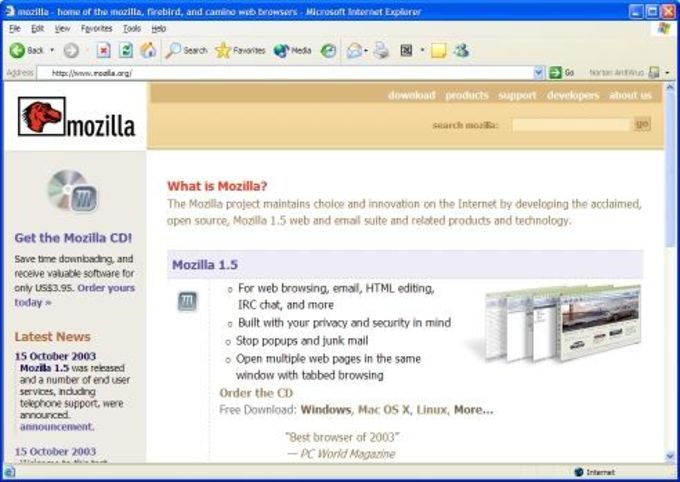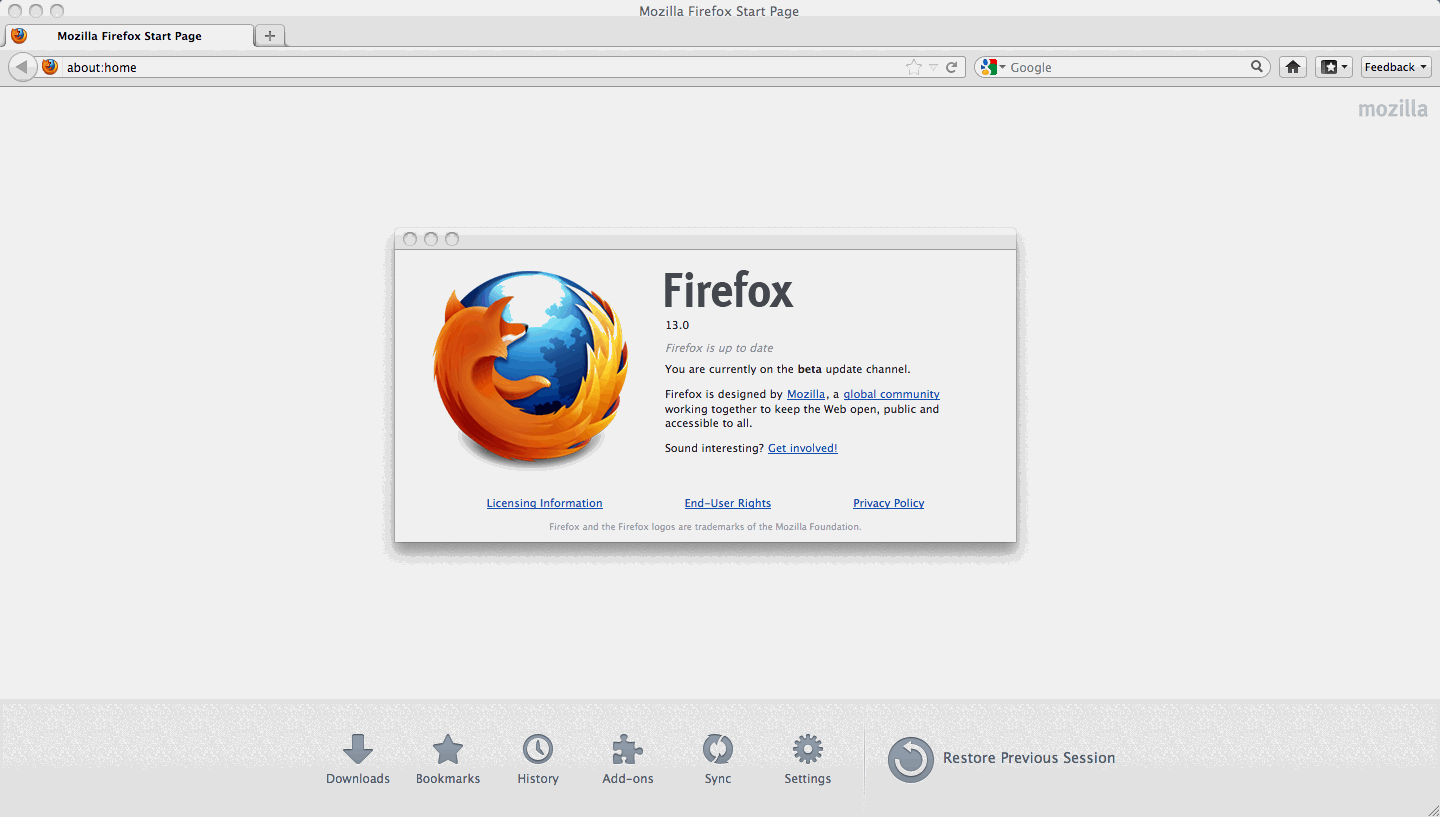Firefox Version
Translation(s): English - Español - Français - Italiano - Русский
Mozilla Firefox, or simply Firefox, is a free and open-source web browser developed by the Mozilla Foundation and its subsidiary, Mozilla Corporation. Firefox is available for many Operating Systems, on desktop and mobile.
Contents
Firefox was created by Dave Hyatt and Blake Ross as an experimental branch of the Mozilla browser, first released as Firefox 1.0 on November 9, 2004. Starting with version 5.0, a rapid release cycle was put into effect, resulting in a new major version release every six weeks.
- Installing Firefox
- Profile
- Download Dark Reader for Firefox. Dark mode for every website. Take care of your eyes, use dark theme for night and daily browsing. Version 4.9.31 Size 521.05 KB.
- Download Mozilla Firefox, a free web browser. Firefox is created by a global not-for-profit dedicated to putting individuals in control online. Get Firefox for Windows, macOS, Linux, Android and iOS today!
Installing Firefox
From Debian packages
On DebianStable, Install the firefox-esr package.
This installs the Extended Support Release of Firefox. ESRs are not updated with new features every six weeks. They are instead supported for more than a year, updating with major security or stability fixes.
Support for languages other than English is available in packages named firefox-esr-l10n*.
On DebianUnstable, to install the Release version of Firefox, install the firefox package.
From Mozilla binaries
Mozilla distributes ready-to-use Firefox binaries for Linux on their website:
https://www.mozilla.org/en-US/firefox/ - Release
https://www.mozilla.org/en-US/firefox/channel/desktop/#beta - Beta
https://www.mozilla.org/en-US/firefox/channel/desktop/#nightly - Nightly
To install any of them on DebianStable:
- Download the Firefox version you want directly from the official website
- Uncompress the archives:
in the /opt directory (system-wide installation - requires Root privileges)
- in your home directory (install only for the current user)
Create a file firefox-stable.desktop (replace stable with beta or nightly if needed) with the contents below:
in the /usr/share/applications directory (system-wide installation - requires Root privileges)
in the ~/.local/share/applications directory (install only for the current user)
Replace /opt/firefox with the path to the directory where you extracted the archive.
If you want to be able to launch Firefox from a CommandLineInterface, create a symlink to the firefox executable in /usr/local/bin/. For example: sudo ln -s /opt/firefox/firefox /usr/local/bin/firefox
If you want to use your manually installed Firefox as the default DebianAlternatives browser (x-www-browser), run sudo update-alternatives --install /usr/bin/x-www-browser x-www-browser /opt/firefox/firefox 200 && sudo update-alternatives --set x-www-browser /opt/firefox/firefox
From Flathub
Mozilla provides an official FlatPak at FlatHub.
If you haven't already set up flatpak, run
Install it:
Run it:
If you have added /var/lib/flatpak/exports/bin to your PATH, you can also run it with the command
If you want to use your Firefox flatpak as the default DebianAlternatives browser (x-www-browser), run
Flatpaks don't support native messaging. Therefore, add-ons which rely on it such as KeePassXC Browser don't work. A workaround for KeePassXC is described in the Flathub forum. Since the KeePassXC's socket has been renamed in KeePassXC 2.6, for this version you need to tweak the solution as described in comment #3
Using snap

Mozilla provides an official Snap package for Firefox:
If you haven't already installed snapd, run
Install it:
Run it:
Snap packages don't support native messaging. Therefore, add-ons which rely on it such as KeePassXC Browser don't work. Since KeePassXC's server socket has been renamed, you need to tweak the workaround as explained in https://discourse.flathub.org/t/how-to-run-firefox-and-keepassxc-in-a-flatpak-and-get-the-keepassxc-browser-add-on-to-work/437/3?u=jro
Profile
Firefox user data (your home page, toolbars, installed extensions, passwords, bookmarks...) are stored in a profile folder. (See this Mozilla support page).
~/.mozilla/firefox/: location of profile directorie, for flatpak installations, it is ~/.var/app/org.mozilla.firefox/.mozilla/firefox/
/etc/firefox-esr/default/profile/: Files to copy to newly created profiles. Use this location to preconfigure Firefox.
~/.mozilla/firefox/*.*/user.js: firefox preferences for each profile. These preferences can also be set from the browser interface, or from the about:config page.
/etc/firefox-esr/firefox-esr.js: default Firefox system-wide preferences. Each profile/user can override these preferences.
You can start the Profile Manager from Firefox or from the command line: firefox --no-remote -P
* If firefox refuses to start with the existing profile because the version of firefox launched is supposedly not compatible, you can try removing the file compatibility.ini within the profiles directory. You may want to back up the profiles directory first, in case of an actual incompatibility.

or, if you are using flatpak
Disabling automatic connections
Firefox makes a number of automated connections to Mozilla's (and other's) servers without explicitly asking the user for approval. Mozilla documents that list in the How to stop Firefox from making automatic connections page. Here is a table of the above parameters and how Debian diverges from the upstream default:
The table below may be out of date. It was created on 2018-09-23 from the upstream page by looking at an empty profile on Firefox ESR 60.2.1esr-1. Mozilla's documentation itself may be missing some parameters as well.
Feature | Parameter | Mozilla | Debian |
Auto-update checking | app.update.enabled | true | false |
Auto-update search engines | browser.search.update | true | true |
Blocklist updating | extensions.blocklist.enabled | true | true |
Anti-phishing and malware protection lists | browser.safebrowsing.downloads.remote.enabled | true | true |
Tracking protection | privacy.trackingprotection.enabled | false | false |
Secure website certificates (OCSP) | security.OCSP.enabled | 1 | 1 |
Link prefetching | network.prefetch-next | true | true |
DNS prefetching | network.dns.disablePrefetch | false (means enabled) | false |
Speculative pre-connections | network.http.speculative-parallel-limit | 6 | 0 |
Add-on list prefetching | N/A (can't be turned off) | enabled | enabled |
Extensions update check | extensions.update.enabled | true | true |
Live Bookmarks updating | N/A (user-enabled) | none by default | none by default |
Downloads restarted | N/A (user-enabled) | N/A | N/A |
Search plugin icon loading | ? | ? | ? |
Firefox Sync | ? (needs user to opt-in) | N/A | N/A |
Snippets | browser.aboutHomeSnippets.updateUrl | enabled | enabled |
Geolocation for default search engine | browser.search.geoip.url | enabled | enabled |
'What's new' page | browser.startup.homepage_override.mstone | enabled | enabled |
Add-on metadata updating | extensions.getAddons.cache.enabled | enabled | enabled |
Telemetry | browser.selfsupport.url | N/A? | N/A? |
Telemetry | toolkit.telemetry.enabled | false in releases, true in nightly | false? there are other parameters |
toolkit.telemetry.coverage.opt-out | not present (means enabled) | not present | |
OpenH264 plugin download | media.gmp-gmpopenh264.enabled | true | false |
WebRTC | multiple | enabled | enabled? |
Send Video To Device | browser.casting.enabled | false | N/A? |
Captive portal detection | network.captive-portal-service.enabled | true | true |
Loopback connection | can't be disabled | disabled on Linux | disabled |
Other projects aim at improving security and privacy in Firefox:
TorBrowser - Firefox-based Web browser aimed at defending against tracking, surveillance, and censorship.
https://github.com/pyllyukko/user.js - Firefox configuration hardening
https://gitlab.com/anarcat/scripts/blob/master/firefox-tmp - Anarcat's firefox-tmp script
Plugins
The only plugin supported by Firefox is FlashPlayer (NPAPI version). Other plugins are no longer supported.
Plugins are found at /usr/lib/mozilla/plugins (system wide) or ~/.mozilla/plugins (current user only).
Troubleshooting
Latest Version Of Firefox
Firefox is consistently crashing on a website:
Run firefox in safe mode (extensions and themes disabled): firefox --safe-mode
- If this fixes the problem, one of your extensions is the root cause, if not:
Create a new firefox profile: firefox --no-remote -P (or from the about:profiles page)
No sound:
Go through the general Sound troubleshooting steps. If this fails, reinstall alsa and pulseaudio:
Firefox Version 84
Iceweasel
From Debian Etch through Debian Jessie (9th June 2016), Mozilla Firefox was not available in Debian with the official name or branding. Instead, Debian shipped a free-software version rebranded by Debian, named Iceweasel. This fork was maintained because of a disagreement with Mozilla regarding backporting of the security fixes to DebianStable, and as the result could not use trademarked Mozilla artwork.
Starting from DebianStretch, the iceweasel package has been made a transitional package for firefox-esr. Normal Debian support policies, including patches for bug fixes, apply to the package.
https://lists.debian.org/debian-devel/2006/10/msg00665.html - Will IceWeasel be based on a fork or on vanilla FireFox?
https://lwn.net/Articles/676799/ - The end of the Iceweasel Age
https://bugs.debian.org/cgi-bin/bugreport.cgi?bug=815006 - Renaming Iceweasel to Firefox
Iceweasel used to require gstreamer1.0-libav gstreamer1.0-plugins-good packages for good video playback support.
External links
Mozilla Firefox Homepage
Debian Mozilla Team
Firefox - Arch Wiki
#debian-mozillaIRC channel
CategoryWebBrowser | CategorySoftware | CategoryNetworkApplication | CategoryRedundant: merge relevant info from Mozilla
Other Languages:
- Stable: http://www.mozilla.org/en-US/firefox/all/
- Beta: http://www.mozilla.org/en-US/firefox/beta/all/
Mozilla Firefox is a fast, full-featured Web browser. Firefox includes pop-up blocking, tab-browsing, integrated Google search, simplified privacy controls, a streamlined browser window that shows a number of additional features that work with you to help you get the most out of your time online.

Installation
Installing Firefox was a fine , quick experience.A new feature checks your add-ons to see which ones you installed and which ones come from third-party vendors, such as security suite makers. The browser will now ask you if you'd like to disable any of these third-party add-ons.
Interface
The menu bar has been squished into an orange button on the upper left, with menu options spread across two columns.the menu makes it much easier to get to bookmarks, add-ons, and history, as they now all live on one Menu pane.
Firefox Version 1
Performance
Firefox is built on top of the powerful new Gecko platform, resulting in a safer, easier to use and more personal product.Mozilla plans to crowdsource its performance data to learn more about how the browser performs in real-world situations.
Firefox Version 68
Features
Firefox's features are robust and generally competitive. The most important feature in the modern Firefox is Sync.Sync now smoothly syncs your bookmarks, passwords, preferences, history, and tabs, not only with other computers, but also with your Android version of Firefox.
